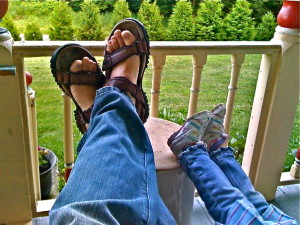Imitation and Movement for Young Children
 In observing young children one can see that they are attracted to movement with such keen enthusiasm that they cannot sit still, but must move and imitate what they have seen. In the “Pedagogical Value of the Knowledge of Man and the Cultural Value of Pedagogy” Rudolf Steiner shares that “the little child clings with his perceptions to gestures, movements, and motion before all else and that when he perceives any kind of motion he feels the inner urge to imitate it”. In this uninhibited mood they are lost in their surroundings with complete devotion, reverence and awe for what they experience.
In observing young children one can see that they are attracted to movement with such keen enthusiasm that they cannot sit still, but must move and imitate what they have seen. In the “Pedagogical Value of the Knowledge of Man and the Cultural Value of Pedagogy” Rudolf Steiner shares that “the little child clings with his perceptions to gestures, movements, and motion before all else and that when he perceives any kind of motion he feels the inner urge to imitate it”. In this uninhibited mood they are lost in their surroundings with complete devotion, reverence and awe for what they experience.
When the environment is such that the child can be surrounded with movement worthy of imitation, this innately religious devotion is cultivated. Unfortunately, the many handy devices of modern technology hardly provided opportunities for this native capacity. Instead it is helpful to use the more old fashioned devices, for example brooms, rakes, shovels, egg beaters, etc. which provide movement worthy of imitation. It is also most helpful for the child to see an adult who approaches their task with joy and enthusiasm. Daily tasks become inspirational as one realizes that the child can fully experience immersion in reverence and spiritual devotion to the task in the mood of the movement and activity and that this is an antidote to the modern mood of pessimism and sarcasm in adolescence. The child experiences movement as an innately religious experience. This can be cultivated by telling stories of fairies and gnomes or events of your life with gestures and movement imbued with meaning. Children love the movement and activity that fathers often provide.
These old fashioned tools also provide an antidote to the noise that modern devices make. In the formative years a child’s sensory system becomes overwhelmed by such noise. The ear’s capacity to hear becomes coarsened and the perception of the “Music of the Spheres” in the natural tones of birds, the wind, moving water, etc. are lost.A fixation on mechanical noises can develop with a hardening effect on the organs. A quiet time of blessing or prayer is helpful where the attitude and gesture of the reverent adult reveals their inner life and counteracts the coarsening tendency of modern sounds.
In Waldorf parenting and education attention to the subtle details of cultivating soul and spiritual values is emphasized. These experiences of religious devotion in the imitation of the environment and of reverence and awe deeply felt in simple events become a wellspring of vitality for their health and wellbeing in adulthood.
Knowing this you can create a daily rhythm which embraces the child being involved in simple household activities. For instance, when they are puttering about under your feet as you make breakfast, they could be exploring the nature of the material world. Thereby they are experiencing spirit in matter, a gift which they have brought with them
from their recent experiences before birth in the spiritual world. Eventually, they will be so inspired and interested in your activity that they will clamor to participate. At that stage find ways for them to “help”, such as cutting bananas with a butter knife or buttering the toast. They are not only learning the wisdom inherent in practical activities and perceptual and fine motor skills, but they are also learning the value of service to the family.




